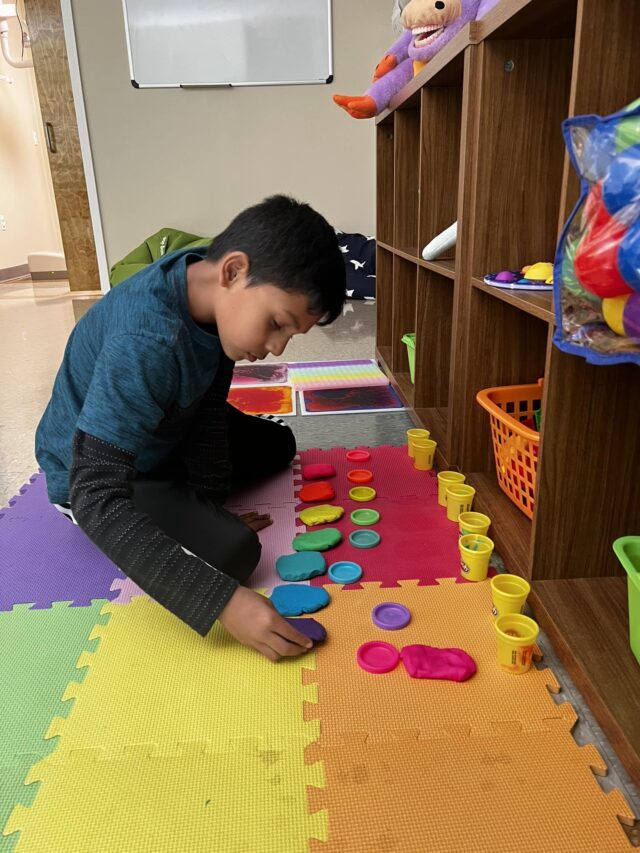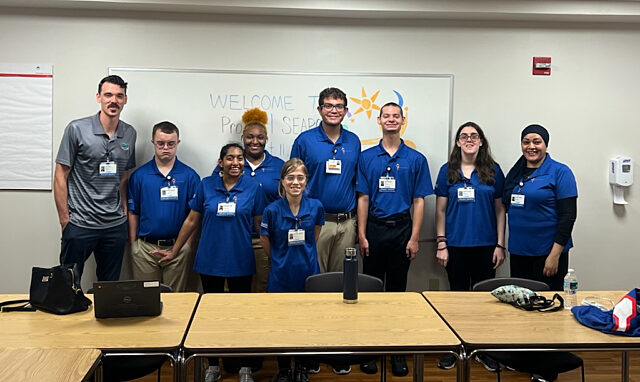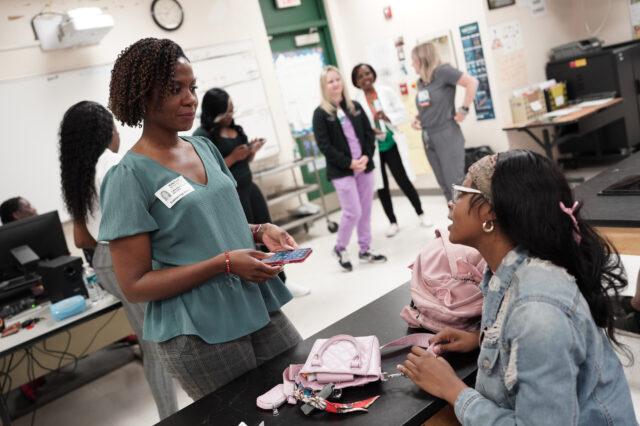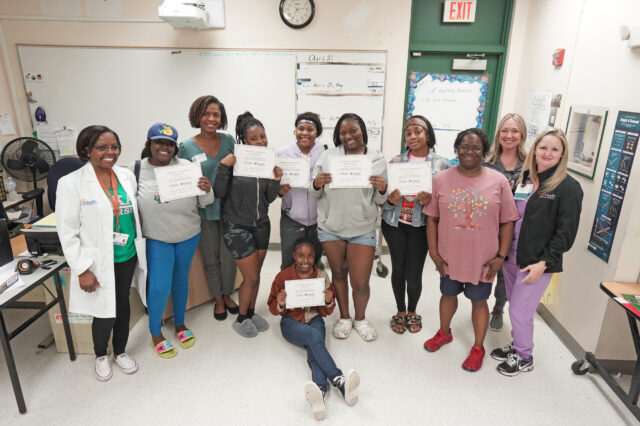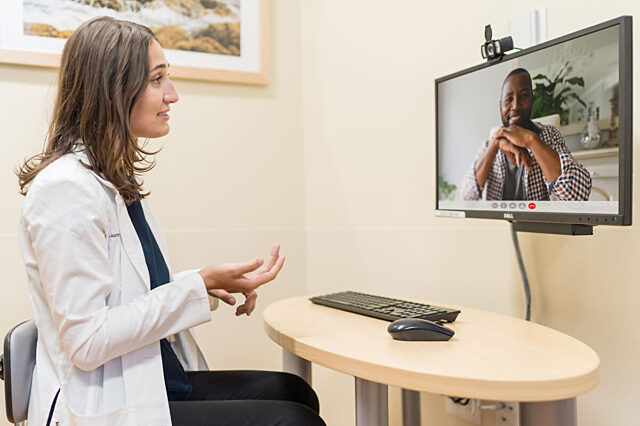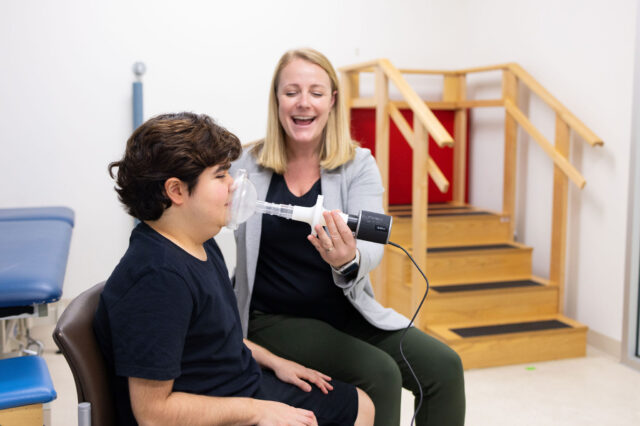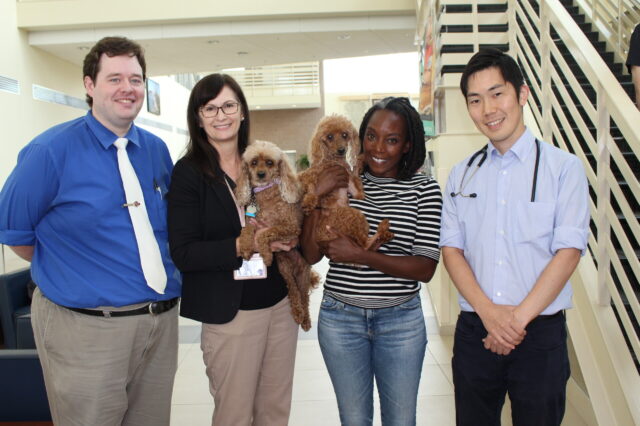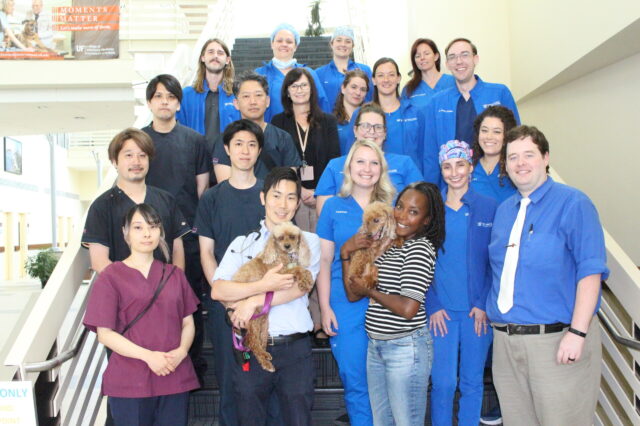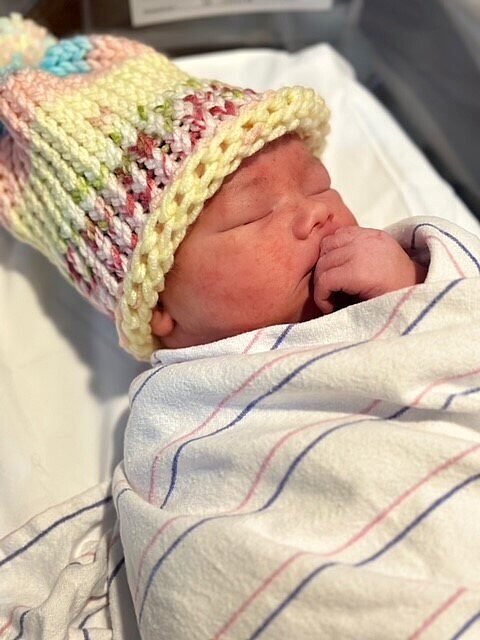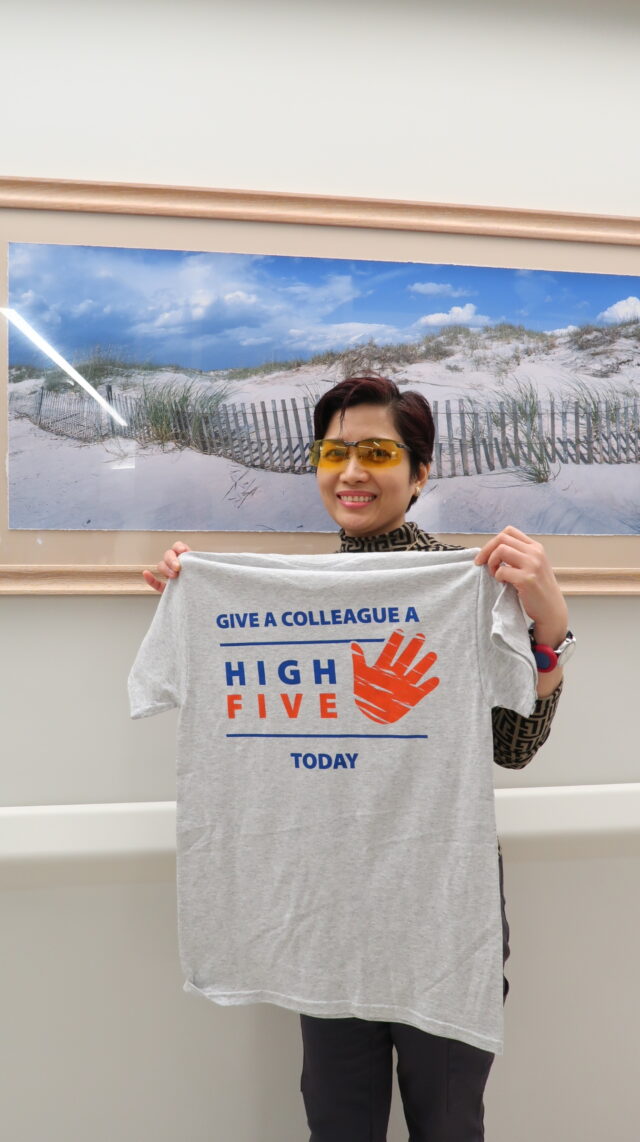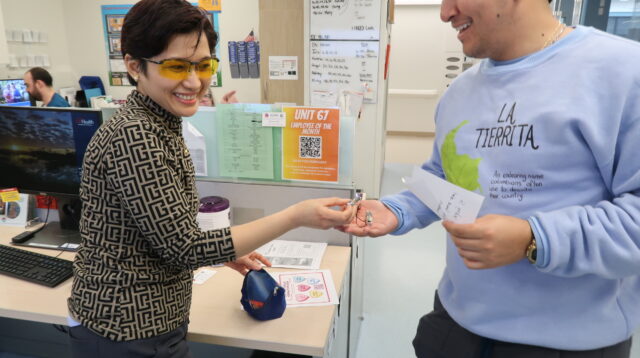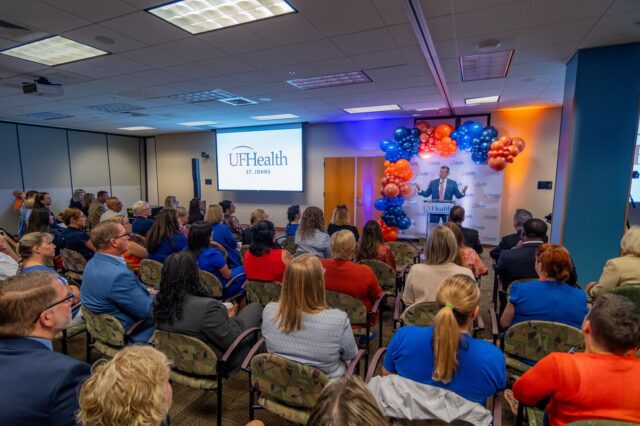Year of gratitude: Embracing our values
At UF Health, we bridge discoveries with clinical care, leading to new advances that offer hope and healing for our patients and their loved ones.
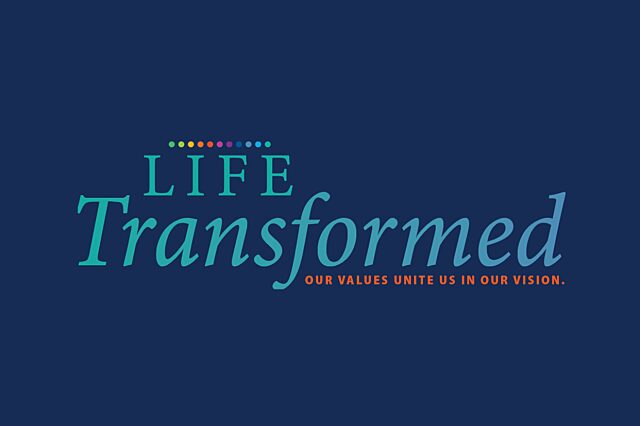
It’s our mission and our passion — transforming lives ― through scientific discovery, teaching, patient care and community engagement. Together, through our collective efforts, we are making tremendous strides to improve health for our communities.
Showcased through the vignettes below are stories of gratitude, reflecting our collective achievements and embodying the values we all embrace and live each and every day at UF Health.
UF colleges
- Dentistry
- Medicine
- Medicine - Jacksonville
- Nursing
- Pharmacy
- Public Health and Health Professions
- Veterinary Medicine
Patient care
UF College of Dentistry
Access to oral health care for persons with special needs is one of the most pressing concerns across the nation. It’s created by multiple hurdles but especially an acute shortage of qualified providers. For over a decade, the University of Florida College of Dentistry has focused on innovative dental solutions for these vulnerable groups and, during 2023, added significant services in four UF-owned and affiliated dental centers to care for adults and children with special needs.
Not long after beginning to provide oral health care at the Marion County Department of Health in late 2023, Bryan Smallwood, D.M.D., a 2022 UF College of Dentistry graduate and now an assistant professor at the college, had a small but meaningful breakthrough with a patient in his 40s. The patient, who has developmental disabilities and autism spectrum disorder, experienced a lifetime of high anxiety during dental care. The referring dentist thought the patient would require care under general anesthesia due to his history of dental fear and anxiety.
Funding from a new CareQuest grant to the college to provide oral health for persons with special needs allowed Smallwood to take time with the patient and actively listen to him and the patient’s mother to fully understand their needs and concerns. “Just spending time with him, which most dentists can’t do in a normal practice environment, I realized that he wanted to know how things worked and to understand what was happening,” Smallwood said.
Smallwood gave the patient a mirror so he could watch during his exam and feel reassured. That simple act made a world of difference. For the first time in the patient’s life, his treatment anxiety lessened and Smallwood was able to restore the patient’s teeth in the dental office that same day, using only local anesthesia and without sedation.
“Developmentally disabled individuals, in particular, face steep challenges in accessing oral health care, regardless of their socioeconomic status, and suffer disproportionately from oral health issues, such as malnutrition, speech problems and potentially serious oral infections,” said A. Isabel Garcia, D.D.S., M.P.H., dean of the UF College of Dentistry.
The Marion County of Department of Health, or MCDOH, recently joined the UF Statewide Network for Community Oral Health, comprising five UF-owned dental centers and 11 affiliated sites, where dental students and residents care for patients during external rotations. The program at MCDOH is the newest resource in the college’s growing list of options for patients with special needs in Florida, made possible by the support from numerous philanthropic organizations.
The college’s work in this area goes back to decades of specialized dental care provided at Tacachale, a community for adults with disabilities in Gainesville. Efforts expanded in 2010 when the Special Day Foundation began to fund specialized oral health care for adults with special needs in the college’s St. Petersburg Dental Center. In 2020, Special Day expanded support to two additional UF centers — UF Health Hialeah Dental Center and the NCEF Pediatric Dental Center in Naples. And, with support from the Naples Children and Education Foundation, Special Day Foundation, the Richard M. Schulze Family Foundation, the B. Thomas Golisano Foundation and Henry Schein Cares last year, the NCEF Pediatric Dental Center in Naples added another resource with the opening of a sensory-adapted room designed to create a unique and comforting space for children with autism and sensory disorders. There, UF College of Dentistry dentists and pediatric dental residents work to create a positive relationship with patients, helping the children transition to dental care in a regular setting.
According to the Special Day Foundation, over half a million Florida adults and children are estimated to have developmental disabilities and limited funding available to afford dental care. “These three UF centers are also homes to dental residency programs, so the value is, in essence, two-fold. In addition to giving vulnerable individuals a pathway to optimal oral health, our residents gain the skills needed to care for and increase access to special needs patients in Florida for years to come,” Garcia said.
Together, these programs extend the college’s ability to close the gap in oral health disparities across the state and make a difference in the lives, and health, of patients every day. Importantly, they are creating a new generation of dentists and specialists well-equipped to deal with some of Florida’s most needy and neglected patients.
UF College of Medicine
Every weekday morning, 21-year-old Mathias Misener wakes up, dons his uniform and badge and rides a Gainesville Regional Transit System bus to UF Health Shands Hospital to begin his internship duties for the day.
Sometimes, he collects and transports used hospital linens and scrubs for laundering. Other times, he restocks cleaning supplies throughout the hospital’s many units and floors, working with supervisors and colleagues to ensure care providers have the materials they need.
Misener, who has Down syndrome, is one of eight neurodivergent Alachua County Public Schools students learning competitive job and life skills at the hospital as part of a yearlong internship program called Project SEARCH. The program launched in Alachua County in fall 2023 as part of an initiative under the community and belonging pillar of the University of Florida College of Medicine’s strategic plan.
“I think this program is much needed, and I am so glad it started when it did and Mathias was able to participate,” said Barbara Misener, Mathias’ mother. “He generally has a smile and is enthused about what he’s doing. He’s transporting himself there, which is a huge step toward independence, and the program has been great in making him advocate for himself more.”
Barbara Misener added that she hopes this experience will help her son find a job where he can feel like he is making a difference. After leaving the school system, she said, there is not much support for people with intellectual disabilities to find employment and independence. But thanks to Project SEARCH, her son, who dreams of meaningful work and one day earning a driver’s license, has help and opportunities to get on-the-job experience in a health care setting.
“Some companies don’t know they can employ people with disabilities,” she said. “Having a program like this to teach these young adults job skills is huge.”
First developed in 1996 at Cincinnati Children’s Hospital Medical Center, Project SEARCH has many sites around the U.S. and worldwide. The program typically involves a rotation through three internships, along with training and mentorship for skills like managing finances and communicating with co-workers. Project SEARCH is supported in Gainesville in combination with the UF College of Medicine, UF Health, Alachua County Public Schools, the Center for Independent Living of North Central Florida, the Florida Department of Education Vocational Rehabilitation division, the UF Center for Autism and Related Disabilities, and the Agency for Persons with Disabilities.
Melissa Williams, mother of Project SEARCH intern John Williams, said the program is teaching her son important life, social and business skills, like how to interact with people professionally and how to problem-solve. It also brings him opportunities for fun and fulfillment.
“It gives him a purpose every day,” Melissa Williams said.
John Williams’ first internship rotation at UF Health is in environmental services, where he cleans windows, vacuums and performs other duties on the third floor of the UF Health Heart & Vascular and Neuromedicine hospitals. His two twin sisters drop him off at the bus stop in the mornings, and like Misener, he rides to and from work alone using public transportation.
On his lunch break, Williams likes to practice the budgeting skills he and his fellow interns are learning to pick out different meal options and eat with a friend on the same environmental services rotation.
“He enjoys the independence,” Melissa Williams said. “Eventually, we hope to find him a place to live alone once he gets older and more experienced with taking care of himself, but we’re not in a rush.”
UF College of Nursing
Clinician and faculty teams at UF Health Shands and the University of Florida College of Nursing can proudly claim they have charted a new frontier in nursing innovation, which has led to the transformation of how care is delivered and is inspiring new generations of nurses.
More than one year later, the inaugural cohort of nurses and nurse faculty from UF Health Shands and the UF College of Nursing’s joint demonstration project initiative has completed the pilot phase of each of their funded research projects, intended to develop innovations and address the complex challenges facing the health care system today. Ranging from efforts to solve the mystery of why babies from specific locations have a higher rate of complex heart lesions to research aimed at improving wound treatment for COVID-19 patients, all these projects used ideas taken from the nursing bedside, as well as the community, to make a lasting difference in health care.
One successful project was launched to provide mentorship opportunities for high school students in Gainesville’s backyard,at Eastside High School. More than 20 students learned what it was like to work as a professional nurse, discovered the career’s educational requirements and gained hands-on experience by practicing clinical skills, such as how to check blood pressure. Led by UF Health Shands nurses who graduated from Eastside, as well as College of Nursing faculty, six sessions were held with the students throughout the spring 2023 semester.
A select number of students also received full funding to earn their certified nursing assistant license through Gator CNA, a preparatory course that offers the nursing assistant competency exam. That will allow them to secure an entry-level clinical job at UF Health and could serve as a model for underserved students to enter jobs in health care after graduation.
For College of Nursing assistant professor Lakeshia Cousin, Ph.D., APRN, the opportunity to give back to the community is a way to repay a life-changing experience she had as a high school student.
Prior to becoming a tenure-track faculty member at Florida’s preeminent nursing institution, Cousin struggled with school and did not believe that a nursing career or higher education was in the cards until she happened to go on a college tour through a community mentorship program. She was grateful to have the chance to share her perspective and words of wisdom with others — now as a mentor — and potentially change the course of someone’s life.
The program originally got its start when Cousin — in collaboration with UF Health Shands Unit 66 Clinical Nurse Leader Kim Martinez, M.S.N., R.N., CCRN, and Nurse Specialist Courtney Bowen, M.S.N., R.N., R.N.-B.C. — saw a need to increase the number of nurses choosing to build their careers locally. The program allows potential nurses to find support at a much earlier age than current outreach used by the health system, introducing high school students with strong community roots to the career path.
For students like Eastside High School senior Amaya Monroe, the experience marks the first step in what she hopes will be a long-lasting health care career.
”It was a very rewarding opportunity,” Monroe said. “I want to get a job at Shands and then go to college, and this mentorship program set me up in a position to do just that.”
The 2024 cohort of UF Nursing/UF Health Demonstration Projects comprises nine interdisciplinary teams — with the opportunity now including four groups from UF Health Jacksonville for the first time.
UF College of Pharmacy
MyRx, a new UF Health service developed by pharmacists in the University of Florida College of Pharmacy, was launched in 2023 to provide patients with a convenient way to understand their pharmacogenetic test results and improve drug therapy.
The program arrives at a time when studies show nine out of 10 people have variations in their genes that may change how they respond to common medications.
Pharmacogenetic testing helps clinicians and patients understand why certain people do not respond to or have side effects from certain medications. The test looks at specific genes to help predict the types of medications and dosages that may be best for a patient. A single administration of the test serves as a lifelong guide for selecting medications.
Drugs commonly affected by pharmacogenetic influences include those used to treat depression, anxiety, pain and cardiovascular conditions.
“Pharmacogenetic testing is a great opportunity to improve drug therapy; however, the biggest challenge is understanding the test results,” said Emily Cicali, Pharm.D., the clinical director of MyRx and a clinical associate professor in the UF College of Pharmacy. “We established MyRx to provide patients and their providers with a resource to get more information about drug response. If someone has trouble with medication or is confused about why a drug may not be working for them, then this could be a beneficial service.”
Patients participating in the MyRx service first will need to complete pharmacogenetic testing. The simple, noninvasive cheek swab can be ordered from MyRx or the patient can provide results from a previous test conducted at an approved lab. A clinical pharmacist with specialized training in pharmacogenetics will review the test results and the patient’s medication history before hosting a video consultation.
During the 30-minute consultation, a MyRx pharmacist will walk a patient through their test results and explain what they mean for their current drug regimen and the implications for future drug therapy. The pharmacist will answer any questions and develop a specific medication plan to share with the patient’s doctor.
“We are here to educate, inform and empower patients to optimize their drug therapy,” Cicali said. “At the end of the visit, we will provide the patient’s doctor with a complete consultation note. Patients then are encouraged to reach out to their provider to determine if any medication changes are recommended.”
Physicians are a key referral source for the program. The MyRx team works closely with providers and the patient’s health care team to maximize the benefits of pharmacogenomic testing.
“I have used pharmacogenetic testing to create a treatment plan for some of my patients with depression and ADHD,” said Molly Posa, M.D., an associate professor of pediatrics in the UF College of Medicine. “I am grateful for the service and the information it provides to help select the most effective medication for my patients. It’s an invaluable tool in my clinical evaluation and decision-making process.”
MyRx welcomes self-referrals as well as physician referrals and plans to partner with pharmacies interested in providing pharmacogenetic testing. Visit myrx.UFHealth.org for more information.
UF College of Public Health and Health Professions
The journey from early career faculty member, and eventually, to lead or principal investigator on a large-scale study can seem daunting. Scientists need to build the case for a large grant, often through support of smaller grants. It can take several years and many grant proposal rejections before faculty members have the financial support they need to build a research program that makes significant contributions toward improving people’s health and well-being.
In 2023, the University of Florida College of Public Health and Health Professions launched the PHHP Research Innovation Fund, a program to help faculty, particularly early career researchers, on their path to discovery.
The PHHP Research Innovation Fund supports pilot testing or feasibility studies that will place faculty members in the best possible position to obtain research funding from outside agencies. Unlike many other grant programs that may take months, or even a year, to respond with decisions on applications, the PHHP Research Innovation Fund makes decisions and provides funds of up to $25,000 per award within four weeks of submission. The program is organized around three major themes: artificial intelligence, direct clinical impact and general topics in public health and health professions.
Among the first PHHP Research Innovation Fund grants awarded are projects in HIV prevention, hearing loss and tinnitus among patients with long COVID-19, bone care for patients with muscular dystrophy, and the creation of a dataset to examine obesity treatment in relation to cancer prevention.
The PHHP Research Innovation Fund recently received an important boost through a generous gift from Jeffrey Fitzsimmons, Ph.D., who, early in his UF research career, received a small internal grant that allowed him to buy a piece of equipment and fund a graduate student so they could do a limited set of experiments. That preliminary data led to Fitzsimmons submitting a larger NIH grant that resulted in support for several years.
“Without that early support I would not have been able to convince the NIH that our ideas were worth pursuing,” Fitzsimmons said. “So I am an enthusiastic supporter of small seed grants and a simple and direct process for obtaining them. I like the idea so much that I am pledging support for the program to help match the funding from PHHP. I believe that all new faculty members deserve a chance to pursue new ideas that could shape the future of health care for years to come.”
Young-Rock Hong, Ph.D., an assistant professor in the PHHP department of health services research, management and policy, is one of the first recipients of a PHHP Research Innovation Fund grant. He is grateful the award enables him to balance the multifaceted responsibilities of academia with meeting his research goals.
“As an early-stage investigator, having protected time for research is crucial. Academic institutions often have teaching and service responsibilities that limit the time available for developing new and expanding research programs,” Hong said. “Luckily, the PHHP Research Innovation Fund is a valuable resource that helps overcome these challenges and allows me to advance my research program.”
UF College of Veterinary Medicine
In August 2023, the University of Florida College of Veterinary Medicine launched a new open heart surgery program for dogs, becoming the only program of its kind in the United States and the only one to offer the complex procedure known as mitral valve repair.
Previously, dogs with mitral valve disease in the United States would have to travel overseas for the lifesaving procedure. The new program means owners of dogs with the devastating ailment can receive care for their animals without the additional cost and complexities of international travel. Access to surgical mitral valve repair is limited, because only a few veterinary surgery centers offer this highly specialized procedure, which must be performed by a skilled surgeon using cardiopulmonary bypass.
Made possible by the hiring of Dr. Katsuhiro Matsuura, a skilled veterinary cardiac surgeon from Japan, the new program exemplifies the theme of “Transformation through Innovation,” the college’s strategic planning moniker and an offshoot of UF Health’s “Life Transformed” campaign.
Under Matsuura’s guidance, the open heart surgery team is currently performing three to four surgeries per month. Successful recipients of mitral valve surgery go from a less-than-one-year life expectancy without surgery to being off medications and typically experiencing many years of survival after surgery.
“Making this program successful involves an incredible amount of teamwork within the hospital and could not occur without the dedication and collaboration of everyone involved,” said program director Darcy Adin, D.V.M., a board-certified veterinary cardiologist who also serves as assistant dean for clinical services at the college. “Veterinary doctor and technician teams from cardiology, anesthesiology, perfusion, the intensive care unit and the operating rooms all work together closely and have been key to our success.”
Mitral valve degeneration causes the valve to leak, a consequence known as mitral regurgitation. Although any dog breed can develop degenerative mitral valve disease, small-breed dogs such as Cavalier King Charles spaniels, dachshunds, Malteses, poodles and chihuahuas are most commonly affected.
“It’s the most common heart disease we see as veterinary cardiologists,” Adin said. “As dogs grow older, it becomes more likely that they have some degree of this disease, although not every dog with mitral valve disease will suffer clinical signs because of it.”
However, the progressive nature of this condition causes enlargement of the heart over time, and approximately 25% to 30% of dogs will experience congestive heart failure, which causes coughing and difficulty breathing. Although medications can relieve fluid retention and support the function of the heart, the degenerative mitral valve continues to deteriorate, and most dogs will succumb to the disease or complications from the medications within one year of heart failure diagnosis.
Surgery to address this problem involves tightening the area around the mitral valve and repairing the chordae tendineae — also called “heart strings” — that support the valve. Mitral valve repair surgery improves the lives of dogs living with degenerative mitral valve disease because it significantly reduces the amount of mitral regurgitation, allowing most dogs to stop taking medications. The lifespan of these animals will then be dictated by age and any conditions they might have besides heart disease, leading to a “Life Transformed” for both the beloved pet and the concerned client.
UF Health Central Florida
Nothing transforms life more than the birth of a baby, and this one resulted in an exceptional gratitude story for Amie Richason, vice president of Human Resources for UF Health Central Florida. Amie not only witnessed the miracle of life but also the compassion and excellence of our obstetrics team.
Amie’s first grandbaby was born at UF Health Leesburg Hospital to very young, first-time parents. The baby was over 9 pounds, which caused some angst in the delivery room.
“When the situation became critical, everyone in the room went into emergency mode. They displayed their professionalism, controlling the situation and ensuring the birth of a healthy baby,” Amie said.
Everyone involved in the birth that day adhered to our service standards by creating confidence. They displayed professionalism, a positive attitude and follow-through. Amie got to witness the UF Health Difference in action, and she is happy to report it had a positive outcome.
The difficult delivery resulted in an extended hospital stay for mother and baby, a situation that can be disheartening for the family. “The care team ran their tests and kept us reassured that the baby was making progress. The pediatrician on-site was amazing.”
The nurses and lactation consultants helped the new mother through nursing challenges so the baby was fed breast milk for the entire length of the hospital stay. “They also allowed the parents to bond with the baby. I thought the care team showed exceptional compassion for these young, first-time parents going through a difficult time.”
The baby passed the car seat test in time to avoid a transfer to the pediatric center at UF Health Shands Children’s Hospital. He was able to get the care he needed right here, close to home, through the excellence and teamwork of our professional staff at the Life Center for Women.
“I am so grateful for the care my family received, and I’m proud that it came from a health care organization I am part of. This experience created an extra bond between my family and my work family. It was wonderful to see the values that we talk about at work come to life and to be the recipient of compassionate, high-quality care right here in our Central Florida community.”
We know that Amie’s life was transformed by the birth of her first grandbaby. Her story shows how UF Health is transforming health care in the Central Florida region, providing better access to a higher quality of care for everyone in our community.
UF Health Jacksonville & UF College of Medicine – Jacksonville
David Henley is a dedicated husband, father and software engineer. He and his wife, Karen, have been married for more than 29 years and have two children together, along with their sweet dog, Forest. They’ve always strived to live a healthy lifestyle and stay active. In fact, David ran regularly with his close group of friends. One of their annual traditions was the Gate River Run, a 15K race that begins in downtown Jacksonville.
In March 2022, David and his friends arrived early to the Gate River Run to warm up. It was a beautiful morning with great weather, and David recalls everything being typical. He had a great run and crossed the finish line with ease. However, just a few seconds after crossing the finish line, David collapsed.
“I remember crossing the finish line, looking at my watch and then I don’t remember much until that evening,” David said.
Fortunately for David, he collapsed directly in front of the UF Health Jacksonville TraumaOne tent. Each year, UF Health Jacksonville is the medical sponsor for the Gate River Run, and the tent is manned with experienced, volunteer medical providers ready to handle any emergency.
“As he crossed the finish line, David was pale, and he fell and hit his head,” said Jennifer Silvey-Cason, emergency preparedness manager at UF Health Jacksonville, who was stationed near the finish line. “At that point, we knew this was a medical emergency.”
Silvey-Cason radioed for immediate team support. Charge Nurse Jennifer Harrell, B.S.N., R.N., CCRN, and TraumaOne Flight Director Tony Hayes, M.S.N., APRN, FNP-C, N.R.P., FP-C, answered the call and ran to his aid. They moved David to the TraumaOne tent just a few steps away, where more providers were waiting to receive him.
Emergency physicians Christine Gage, D.O., and Andrew Schmidt, D.O., were both stationed in the tent, where they quickly examined David and confirmed he had no pulse and was in cardiac arrest.
“My goal in that moment was to do everything we could to try and get that pulse back,” Gage said.
The team began CPR in a well-practiced rhythm, with everyone focused on their role. While Gage was stationed at the foot of the bed directing the team, Schmidt was at the head of the bed, ensuring that David’s airway was stable and protected. Some members of the team focused solely on compressions, while others gained IV access for medications. One step back from the action was trauma surgeon Jeanette Zhang, M.D., who served as code team leader. Zhang was responsible for overseeing the entire process and ensuring that each team member did their part. Altogether, there were about eight to 10 people working to save David’s life.
After delivering a round of CPR, the team saw a life-threatening heart rhythm, known as ventricular fibrillation, on the monitor. They delivered an electrical shock, which converted David’s heart activity into a normal rhythm. Although still unconscious and not aware at this time, David made slight movements and his eyes fluttered — a good sign that his heart was sending blood to his brain again. It was at this point that the team felt hopeful for a positive outcome.
David was then further stabilized and transferred to the TraumaOne Critical Care Transport Ambulance that would take him to UF Health Jacksonville, where emergency and trauma teams would continue his care.
After receiving a concerning text from David’s friend, Karen used the “Find My” app on her phone to track David’s Apple watch and saw that he was at the UF Health Jacksonville emergency room. She immediately caught a ride there with a friend and was able to confirm that David had been admitted.
At UF Health Jacksonville, David was evaluated and had an electrocardiogram, or EKG, to check for possible heart conditions. He was then taken to the Cardiac Catheterization Lab, where the interventional cardiology team examined the vessels in his heart, which they found to be normal with no visible blockages or occlusions.
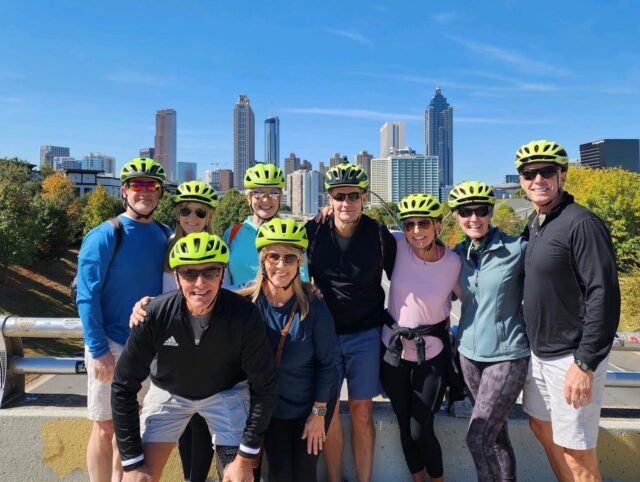
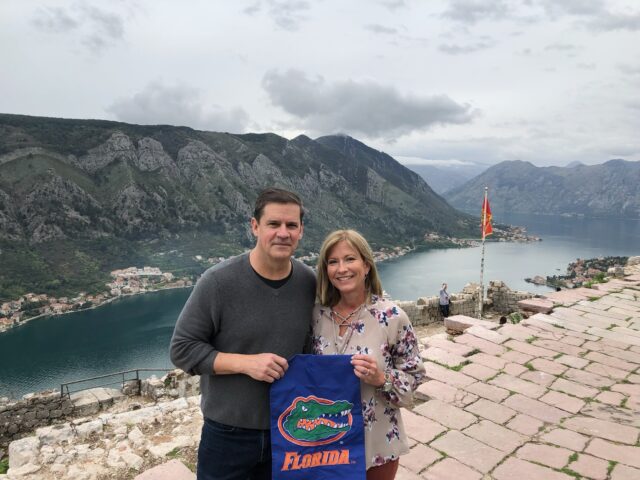
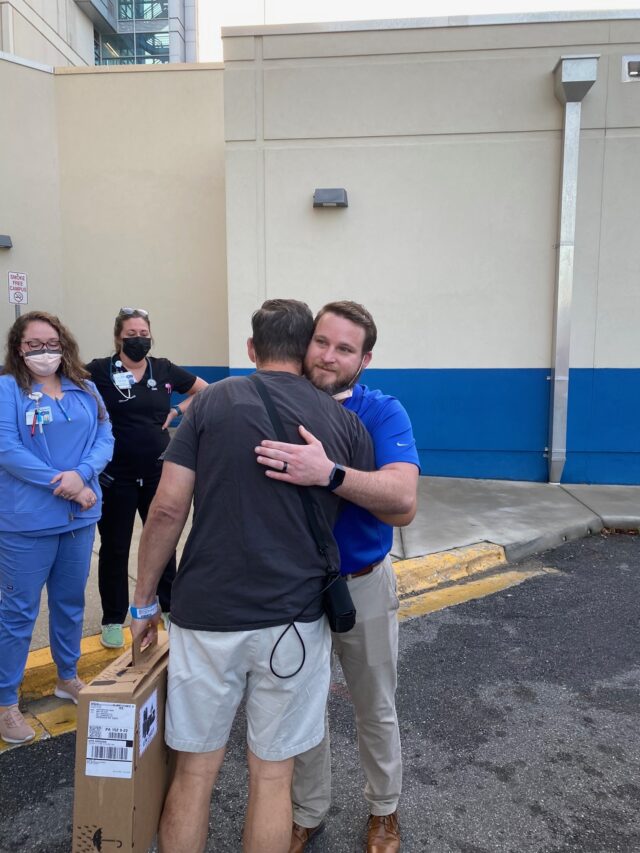
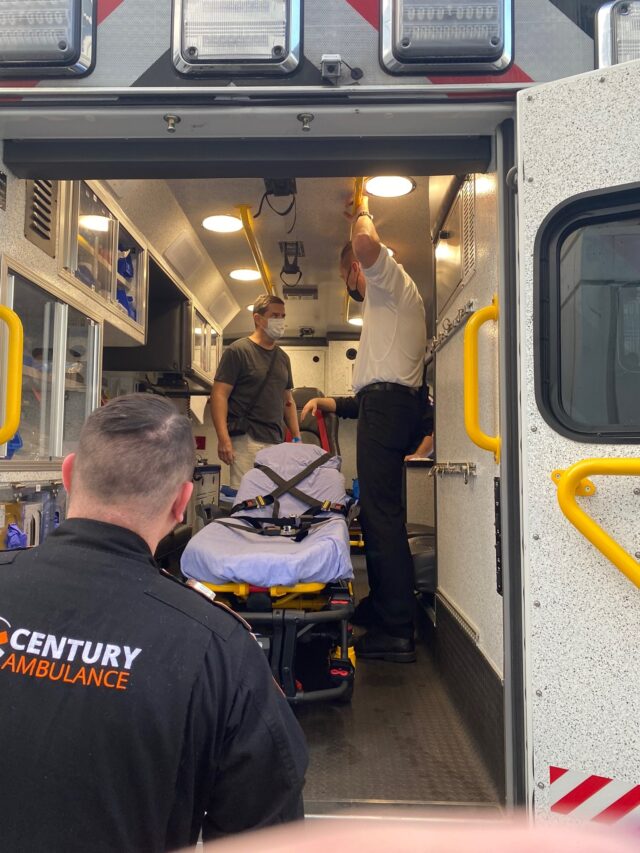
Next David was admitted to the Cardiac Intensive Care Unit, where monitoring continued for a few days. David regained consciousness on the evening of his accident, and Karen stayed by his side during the days that followed.
As he showed progress, David was weaned off the ventilator and his breathing tube was removed. After five days at UF Health Jacksonville, David’s heart was deemed normal and he was set to make a full recovery.
David’s recovery was emotional for his family and everyone involved in his care. It’s rare to see someone come back from David’s situation, much less walk out of the hospital with no major side effects.
During David’s stay at the hospital, members of the team who saved his life stopped by to see him and tell him what happened in the tent. Specifically, Schmidt, Hayes, Harrell and Silvey-Cason regularly checked on David and Karen.
Today, David has a new appreciation for life. He is more conscious of his diet and strives to make healthier choices. While he isn’t running 15K races anymore, he still goes on shorter runs and stays active with modified exercise routines. David also had a defibrillator implanted for peace of mind, which monitors his heartbeat and can deliver a strong electrical shock to restore a regular heart rhythm if needed.
David and Karen are forever grateful to UF Health Jacksonville TraumaOne for saving David’s life and for the care they received while at the hospital.
“I can’t even put into words how thankful I am,” Karen said.
Each year, the TraumaOne tent welcomes volunteers at the Gate River Run. In 2024, David and Karen will join as volunteers to show their gratitude and help make a difference at the same place where David’s life was saved only a year prior.
To learn more about UF Health Jacksonville TraumaOne, visit TraumaOne.UFHealthJax.org.
UF Health Shands
Recognition embodies many things — appreciation of an achievement or service, acknowledgement of something’s validity or showing admiration and respect for another person. For the UF Health Shands hospitals in 2023, recognition was the overarching theme that tied together the refresh of the UF Health Values and the launch of the UF Health High Five employee recognition program.
The 11 UF Health values, part of our vision for a Life Transformed, were incorporated into the UF Health High Five program. Each time someone recognizes an employee, they tag one of the values to the recognition, perfectly intertwining the two initiatives together.
During the first two months of the High Five program, 24% of our UF Health Shands employees had received at least one High Five and 11% of our employees had given at least one High Five.
One employee, Bernadette Gloria, RN, a charge nurse on UF Health Heart & Vascular Hospital Unit 67, has received more than 20 High Fives from colleagues, making her the most recognized employee in our hospital system since the launch of the program.
“Bernadette’s positive attitude and gratitude are contagious, spreading throughout the entire team. She not only takes care of her patients, but also takes care of her colleagues and is always willing to lend a helping hand, offer words of encouragement and complete a High Five for others,” said Beverly Clayton-Scott, RN, MSN, NE-BC, nurse manager, UF Health Heart & Vascular Hospital Unit 67. “Her presence alone makes the work environment more enjoyable and uplifting. She truly embodies what it means to be a team player.”
Bernadette’s High Fives have come from peers as well as leaders, all who compliment her on being a great charge nurse, showing strong leadership, being helpful and above all, being a team player. She is touted for constantly looking for ways to support her staff and going the extra mile.
The extra mile is shown in Bernadette’s love for a healthy work environment. She created a suggestion box for her Emerging Leaders Fellowship program to promote more unity and cooperation on her unit. To help, she handcrafted gifts — beautiful keychains — to increase participation from colleagues. If someone provided a suggestion or even pointed out something that needed to be fixed, they received a keychain from Bernadette. The purpose of the initiative was to promote teamwork and to help decrease turnover and absenteeism among the staff.
“Overall, she is great for retention and recruitment by bringing positivity, a spirit of gratitude and assisting us to create a healthy work environment. She is a leader’s dream employee,” Clayton-Scott said.
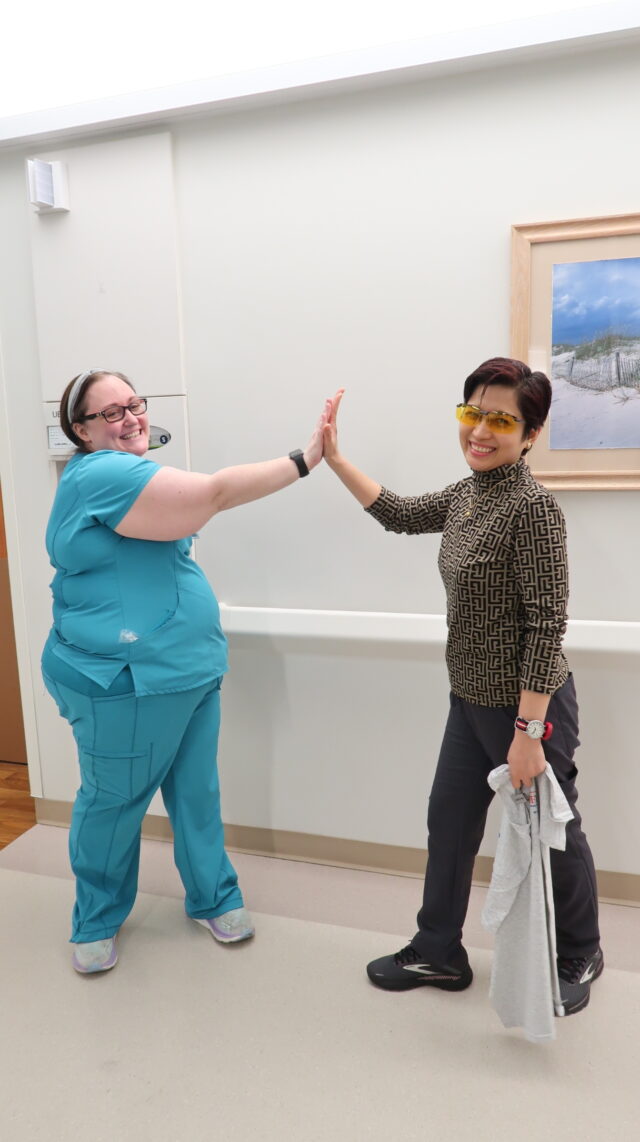
Recognizing others is vital to making others feel respected and heard within their jobs. And it’s something Bernadette has been doing for quite some time.
“Before the High Five program launched, Bernadette would thank everyone for everything they did, so once this system was put in place, it gave her a venue to more publicly to do what she was already doing,” said Nathan Mena, MSN, RN, MEDSURG-BC, clinical leader, UF Health Heart & Vascular Hospital Unit 67.
The irony is the program that gave Bernadette a chance to publicly recognize her co-workers is the one that gave her co-workers the chance to make her the top Hive Five recipient.
UF Health St. Johns
One of the most transformational events in the 133-year history of Flagler Health occurred last September as the organization was officially welcomed into the UF Health system and renamed UF Health St. Johns. The move ensured UF Health St. Johns’ continued role in serving the health care needs of Northeast Florida residents.
Building on its 130-year legacy, UF Health St. Johns' integration into UF Health will provide additional resources, including human and intellectual capital, to expand in one of the state’s fastest-growing regions.
Becoming a part of the UF Health system will enhance access to the latest medical breakthroughs, expanded treatment options, clinical trials and world-renowned comprehensive care. In recognition of its longstanding role in the care of the community, Flagler Hospital was renamed UF Health Flagler Hospital.
As we move toward the future, UF Health St. Johns continues to perpetuate its philosophy of being the community’s resource for lifesaving medical services. Residents of St. Johns County and surrounding communities have placed their trust in UF Health St. Johns to care for family members and bring new life into the world and we look forward to carrying that responsibility into the future for generations to come.
No ventilator-associated events in more than a year
In August 2023, UF Health St. Johns’ Respiratory Care Department celebrated one year without a ventilator-associated event, or VAE. Mechanical ventilation is an essential, lifesaving therapy for patients with critical illness and respiratory failure, and more than 300,000 patients receive mechanical ventilation each year in the United States. These patients are at high risk for complications, including ventilator-associated pneumonia, sepsis, pulmonary embolism and others.
Thanks to the dedication to safe, quality care from the respiratory care team, and collaboration from intensivists and critical care team members, the risk for complications is reduced. The team’s streak continues as they approach 18 months without a VAE.
Behavioral Health Resource Center celebrates its first anniversary
On June 8, 2023, UF Health St. Johns’ Behavioral Health Resource Center, formerly known as the CAIR Center, celebrated its first anniversary. The center opened as an avenue to increase access to behavioral health services, especially for those in crisis or urgent need of behavioral health care.
In its first year, the Behavioral Health Resource Center completed nearly 1,000 visits with nearly 450 patients and expanded from weekday-only patients to serving the community 24 hours per day, 7 days per week. Approximately 20% of these visits would likely have resulted in the patient being seen in the emergency room had the Behavioral Resource Center not been an option.
